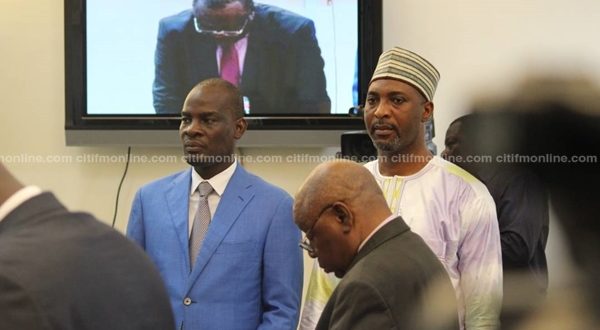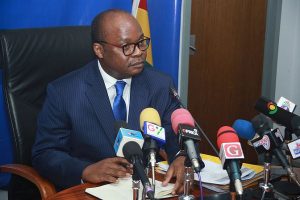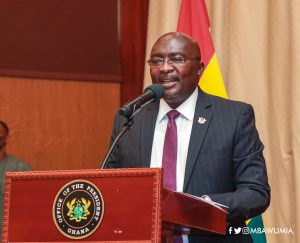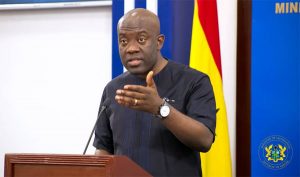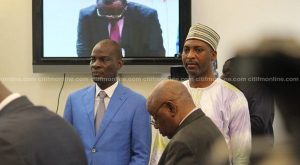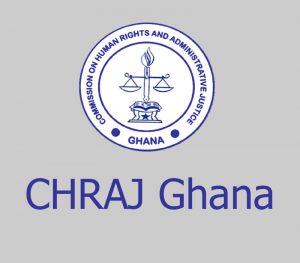The Chairman of the Constitutional, Legal and Parliamentary Affairs Committee of Parliament says the Minority should have withdrawn the censure motion filed against the Finance Minister, Ken Ofori-Atta.
This, Kwame Anyimadu-Antwi explained is because the 8-member Ad-hoc Committee struck out two of the allegations contained in their petition.
Speaking in an interview on JoyNews’ The Probe on Sunday, Kwame Anyimadu-Antwi said he did not see the need for the motion to proceed after grounds one and three were struck out.
Also because the Minister provided answers for the remaining allegations.
“There were seven accusations that the Minority gave. The Committee said two of them he should not answer, but five of them he answered and when he had answered I would have thought that the Committee would come to a consensus to say that the Finance Minister has already done that, so there is no need to pursue this censorship motion. But they were still pursuing and I didn’t see any point in there. I think they should have withdrawn the motion,” he said.
According to him, the censure motion is “much a do about nothing.”
“If I want to speak on the censure motion, I am with the Finance Minister 100%,” he added.
Meanwhile, the Minority Caucus were not able to succeed in their attempt to remove Ken Ofori-Atta from office.
The censure motion against Finance Minister failed to garner the required number of votes to succeed as the Majority Group staged a walk-out from Parliament.
The motion, which was debated on Thursday and subsequently voted on, had only the Minority members being present to vote.
It would be recalled that during the censure motion hearing, Minority presented pieces of evidence to buttress the seven allegations raised against the Finance Minister.
The allegations raised by the Minority are: Conflict of interest, unconstitutional withdrawals from the Consolidated Fund, illegal payment of oil revenues into offshore accounts, deliberate and dishonest misreporting of economic data to Parliament, fiscal recklessness, alarming incompetence and gross mismanagement of the Ghanaian economy.
However, on November, 18, the Committee struck out grounds one and three of the list of seven allegations.
The Committee’s decision was announced by Dr Dominic Akuritinga Ayine, the Co-Chairman of the Parliamentary Ad-hoc Committee on Censure, and Member of Parliament (MP) for Bolgatanga East.
Dr Ayine recalled that on Tuesday, November 15, during the Committee’s sitting, the Finance Minister, who appeared as a person of interest with his counsel, Mr Gabby Asare Ochere-Darko, had raised objection to Ground One of the Motion.
Ground One cites despicable conflict of interest that he (Mr Ofori-Atta) directly benefits from Ghana’s economic woes as his companies receive commissions and other unethical contractual advantage, particularly from Ghana’s debt overhang.
The Co-Chairman said the counsel raised constitutional issues concerning the grounds of conflict of interest in the Parliamentary Motion of Censure of his client.
Counsel noted that the Constitution had empowered the Commission on Human Rights and Administrative Justice (CHRAJ) to deal with the conflict of interest and that it did not lie in the purview of Parliament to deal with the issue.
Dr Ayine noted that Counsel, in his submission, cited a case where his client was taken to court over the issue of conflict of interest, and that the matter travelled all the way to the Supreme Court and judgement was given in his client’s favour.
The Committee had reached a decision that Mr Ofori-Atta would be exempted from answering Ground One as it would give a written ruling on it, he said.
Touching on Ground Three on the “alleged illegal payment of oil revenues into offshore accounts in flagrant violation of Article 176 of the 1992 Constitution”, Dr Ayine said both the Public Interest and Accountability Committee (PIAC) and the Ghana National Petroleum Corporation (GNPC) appeared before the Committee on Thursday, November 17, to give their sides of the story.
He said after hearing from both organizations, the Committee decided to exempt the Finance Minister from answering that question.

